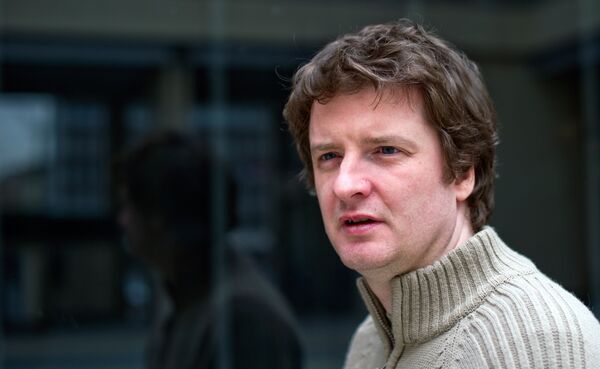Watching Russian presidential candidate Vladimir Zhirinovsky do nothing is an edifying experience and infinitely more interesting, I’d wager, than watching any of his rivals do pretty much anything at all.
Zhirinovsky, for those of you not familiar with the man who has in the past threatened to seize Alaska from the United States and to launch nuclear weapons at Japan, is a veteran politician who burst onto the Russian political scene in the early 1990s with his own unique brand of ultra-nationalism and rabid insanity.
In 1993, his confusingly named Liberal Democratic Party terrified the world when it took first place in Russia’s parliamentary elections with 23% of the vote. But that triumph was the peak of his party’s popularity and, despite once promising free vodka if elected, he has never seriously challenged for the presidency. (His lack of political success is easy to explain - most Russians are either extremely wary about letting a possible madman anywhere near the nuclear button or they believe he is a Kremlin project designed to leech votes from any genuine opposition. Or both.)
Zhirinovsky has remained in the headlines though, regularly getting into brawls with political rivals and threatening to destroy - in a variety of interesting and imaginative ways - anyone or anything at all he sees as Russia’s enemy.
I first saw Zhirinovsky (or the Zhir, as I like to call him) in the flesh in the late 1990s when I was strolling around Moscow’s Victory Park on, er Victory Day with now fellow columnist Daniel Kalder. For some reason, although I’ve never been into collecting autographs, I thought it would be a good idea to get the Zhir to sign a listings magazine I had with me. (I still have it, if anyone wants to bid for it.) Daniel got him to sign a collection of Scottish poetry, as far as I remember.
I had the opportunity to study Zhirinovsky in person again at a downtown Moscow roundtable last week. He’d aged a bit (but then again, so had I), but he was still, well, as mental as ever.
After ranting and raving in his trademark manner for a good ten minutes (despite calling for all participants to limit their comments to “no more than three minutes!”), the Zhir slouched back in his chair and…began to twitch.
First it was his nose – a tiny tremor of a twitch that signalled displeasure at something or other. Then he picked up a pen, stared at it, placed it back down on the table and grimaced at something or other. Another twitch, another grimace, both his hands moving now, picking up objects, examining them, defining their relation to his world and placing them back down. More twitching, a snarl, a half laugh. A semi-audible comment, perhaps an obscenity? All of this in less than 30 seconds.
Tourette’s? It’s hard to say, and the explanation is perhaps too easy and trite.
More twitching, more grabbing of objects and the intense study of them for a micro second before their rejection. He makes to stand up, but sits back down. Looks around. It’s exhausting watching him. I can’t imagine what it must be like to be in the mind of the Zhir.
I recall the comment of General Alexander Lebed, the man credited with ending the first Chechen War, who once famously described Zhirinovsky as "the Lord God's monkey.” But I also remember the words of Richard Nixon, who after a visit to Moscow in 1994 said the following: “Russians have always had a soft spot for holy fools, but they have never chosen them as their leaders - as Mr. Zhirinovsky will soon discover.”
Still, some people in Russia genuinely believe that the Zhir is the man they would like to see in charge of the country. Opinion polls currently place him in third place for March's presidential polls, with nine percent of the vote, just one percent behind veteran Communist Party leader Gennady Zyuganov. Which, I guess, is even more frightening than the existence of the Zhir himself.
(N.B. I’m aware that no one in Russia – or elsewhere, probably – calls Zhirinovsky “the Zhir.” In Russia they call him Zhirik. But I prefer “the Zhir.” It makes him sound like a Dr. Seuss character. And he’d make a great one, I’m sure.)
The views expressed in this article are the author's and do not necessarily represent those of RIA Novosti.
From lurid tales of oligarch excess to scare stories about Moscow’s stranglehold on Europe’s energy supplies, the land that gave us Roman Abramovich and Vladimir Putin is very rarely out of the news. But there is much more to modern Russia than billionaire tycoons and political conspiracy. Marc Bennetts’ weekly column, Deeper Than Oil, goes beyond the headlines to explore the hidden sides of the world’s largest, and often strangest, country.
Marc Bennetts is a journalist who has written about Russian spies, Chechen football and Soviet psychics for a number of UK newspapers, including The Guardian and The Times. He is also the author of Football Dynamo: Modern Russia and the People’s Game (Virgin Books).
Deeper Than Oil: The Red Flag Still Flies High in Russia
Deeper Than Oil: Now even the stars and the heavens turn away from Putin
Deeper Than Oil: Wall on wall battles
Deeper Than Oil: Alternative Reality Russia
Deeper Than Oil: Ripping adventures stories from 2011
Deeper Than Oil: The Skoptsy and striking off the serpent
Deeper Than Oil: Moscow protest fatigue
Deeper Than Oil: I’d have broken the habit of a lifetime for United Russia
Deeper Than Oil: Why I’m still glad Russia got the World Cup



